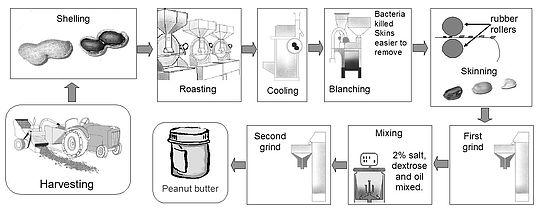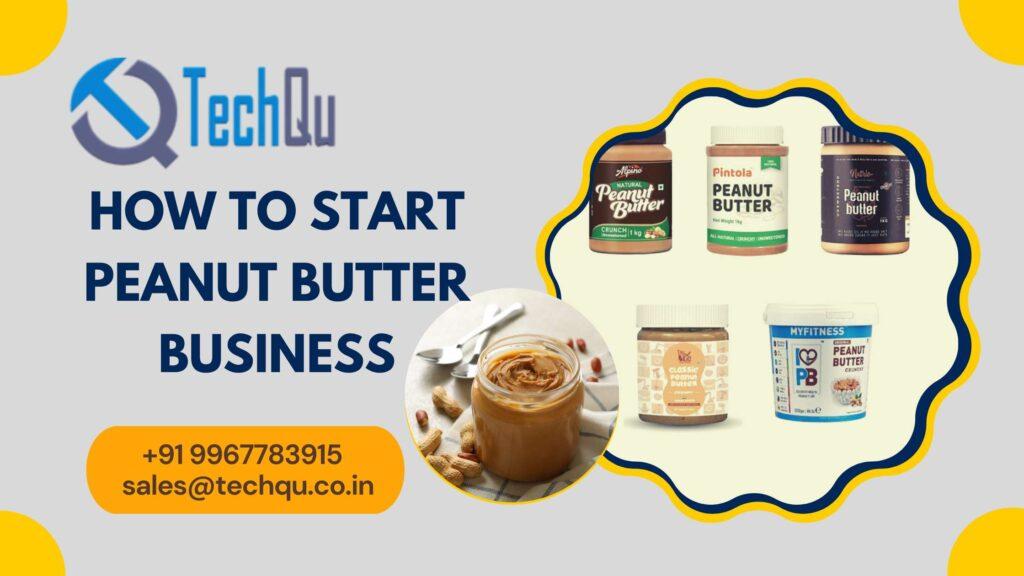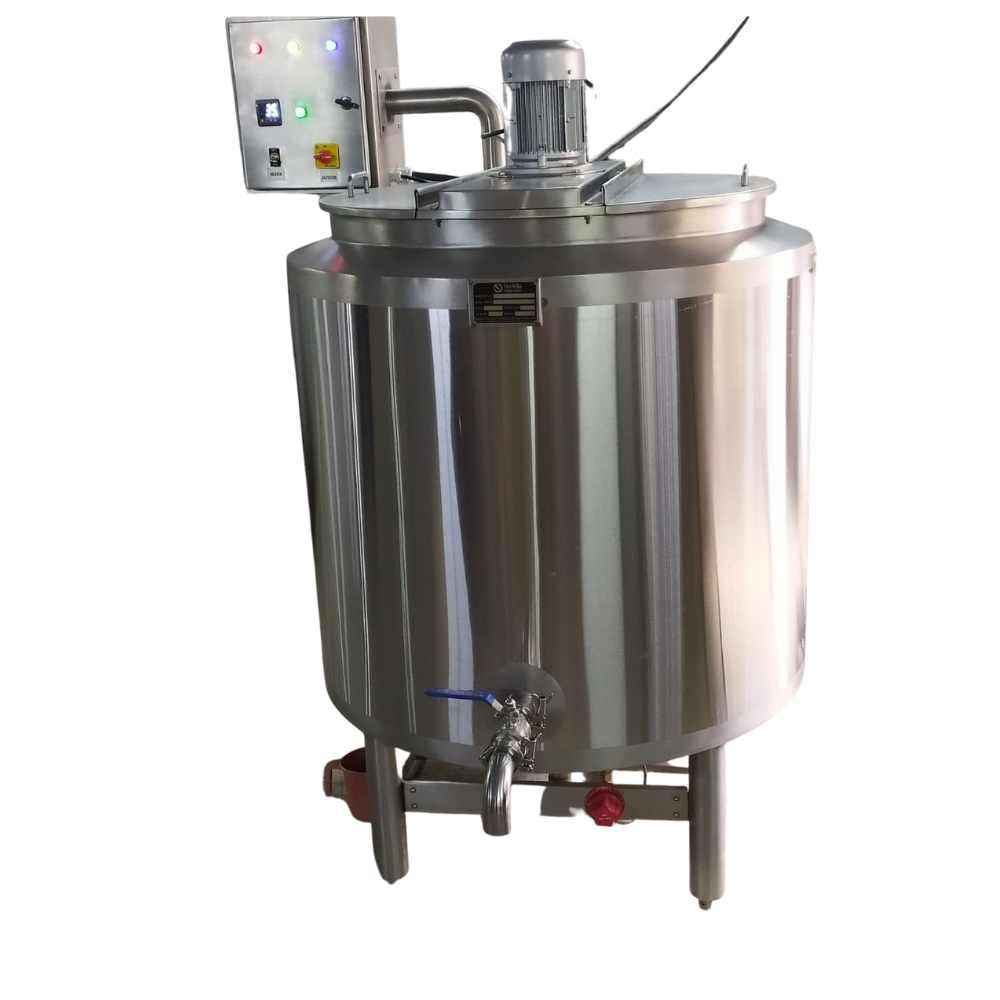Peanut Butter Overview
Peanut Butter is a paste of peanuts that prepared from ground dry roasted peanuts. Peanut butter is a highly nutritive product which is used as bread spread and added to food like rice, relish, smoothies, sauces, cookies and porridge. It’s high in proteins and contains low calories, thus it’s considered a healthy food. Today there are many brands of peanut butter available on supermarket shelves including organic brands like Smuckers Natural Creamy Peanut Butter which comes in several flavors including original creamy and chunky varieties.
Peanut Butter can further also be divided on the basis of the presence of flavoring agents in it. For the enhancement in taste, the product is added with artificial sweeteners, cane syrup, salts, coconut palm sugar, white sugar, etc. These flavoring agents along with food coloring additives are added additionally. They do not affect the basic manufacturing process of peanut butter production.
Peanut butter is widely used in biscuits, cakes and other food items across several sectors including food service industry. It is also used as an ingredient in preparing various snacks such as chocolates, cookies etc. It can be served with breads or crackers or can be eaten alone. There are two types of peanut butter available in market i.e., creamy and crunchy type peanut butter. Creamy type has a smooth texture while crunchy type has coarse texture with small chunks of peanuts visible in it.
Nut butters, such as peanut butter, are good sources of protein and healthy fats. Protein is an important macronutrient and provides our bodies with essential amino acids for muscle development and cell repair. Fats contain essential fatty acids that help us absorb fat-soluble vitamins. There are no significant nutritional differences between natural nut butters or other alternatives, like soy nut butter or almond butter.
The amount of calories present in per 100 grams of peanut butter is 588 kcal. In the same quantity, the amount of carbohydrates is 20 grams which consist of three components starch, sugars, and dietary fibers which are in the amount of 4.8 g, 9.2 g, and 6 g respectively.
Apart from this, there are various vitamins present per 100 grams of peanut butter, such as Thiamine, Riboflavin, Niacin, Pantothenic Acid, Vitamin B6, Folate, Vitamin E, the quantity of these vitamins ranges from 0.11 mg to 13.2 mg. Also, the peanut butter is enriched with various minerals like calcium, iron, magnesium, manganese, phosphorus, potassium, and zinc. The quantity of these minerals ranges from 2.7 mg to 649 mg. Also the water contents in peanut butter is 1.8 g.
Market Size and Profitability of Peanut Butter Business
Peanut butter is expected to dominate the sector in 2019, with a market size of USD 4.20 billion and a 6.10 percent annual growth rate from 2020 to 2027. In the forecast period of 2020-2027, the rising use of peanut oil for skin care goods and medicinal uses will be a driving force for the peanut butter market. Peanut butter is a roasted peanut butter spread that can be spread on toast, bread, or sandwiches. Flex premium peanut butter is often regarded as the best peanut butter on the market, and it is popular in many countries.
In the forecast period of 2020-2027, rising disposable income, rising population, increased awareness about the health advantages of peanut oil, and changes in eating patterns are some of the reasons that will propel the peanut butter market forward. Customers will grow increasingly concerned about their health as a result of increased chronic ailments such as high blood pressure and cardiac difficulties, creating new prospects for the peanut butter sector throughout the time period given.
Peanut butter manufacturing is a very profitable business which can even been done at a small scale using little capital. Many entrepreneurs from all over the world are making money from peanut butter production business.
Peanut butter production is a lucrative business, providing income for millions of families, but there are some essential things you need to do before you venture into the peanut butter business. You have to decide on the size of your peanut butter manufacturing project i.e. the amount of peanut butter that you want to produce daily; location of the peanut butter manufacturing business e.g. a peanut butter plant/factory, and your target market. These choices will be affected by the amount of capital you have, and the size of your target market.
If you do not have a lot of capital, you can always start small and grow your peanut butter project overtime. You also need to carry out market research (Who are you going to sell the peanut butter to? At what price?) and write a peanut butter business plan before you start the peanut butter production project.
Health Benefits of Peanut Butter
Peanut butter, apart from providing a profitable business idea, is a great product of value in itself. It is not exactly a healthy choice, but it is enriched in various elements, vitamins, nutrients, etc. Some of the health benefits are discussed as follows:
1. Protein Rich
Peanut butter contains 90% peanut and as the peanut is a rich source of protein it makes peanut butter a protein-rich product. Per 100 grams of peanut butter has 25-30 gms of protein which is a big number.
2. Low Cholesterol Levels
Peanut Butter has low cholesterol levels due to the presence of unsaturated fats and since they are not saturated, it doesn’t cause any heart diseases. The amount of fat present in peanut butter is really low. It is actually equal to that of olive oil.
3. Prevent Type II diabetes
The presence of unsaturated fats in the peanut butter somehow helps in preventing Type II diabetes. It is scientifically proven that if you consume peanut butter it could reduce the risk of Type II diabetes.
4. Good Source of Vitamin
Peanut Butter also serves as a good source of vitamin. Each quantity of peanut butter has various vitamins such as Thiamine, Riboflavin, Niacin, Pantothenic Acid, Vitamin B6, Folate, Vitamin E, and each one of them performs a different function.
5. Antioxidant Properties
The antioxidant properties of peanut butter are due to the presence of folate, niacin, pyridoxine, thiamine, etc. Apart from this, resveratrol is also present in peanut butter which helps in reducing the risk of cancer, Alzheimer’s disease, fungal infections, etc.
6. Prevents Cancer
Peanut Butter contains B- sitosterol which is great in fighting with the cancer cells. Also, the presence of resveratrol prevents the chances of cancer.
7. Regulate Blood Sugar Level
Peanut Butter is rich in Magnesium which is important in the development of muscle, bone, and immune systems. Apart from this, Magnesium also helps in the blood sugar level.
8. Rich In Dietary Fiber
Peanuts are rich in dietary fibers, and that automatically makes peanut butter enriched in dietary fibers too. And dietary fibers helps us with the prevention of several diseases such as cholesterol, constipation, heart diseases, etc.
Steps to start a Profitable Peanut Butter Business
- Understand the peanut butter making process
The first step in starting a peanut butter making business is to familiarize yourself with the process involved in making this popular condiment.
Peanuts are roasted, then ground into a smooth paste and seasoned with various spices or other ingredients such as salt, sugar, or even chocolate.
This involves having access to high-quality grinding machines and food processing equipment that can ensure a clean and hygienic manufacturing process.
High-quality peanuts are used to make peanut butter. The more quality of the peanuts, the tastier and healthier will be the peanut butter. If you want to start this business on a large scale, you can get a peanut shelling machine to remove peanuts from its shells quickly.
Else, you can directly buy peanuts without shells from the market. The first process includes roasting using roasters. After cooling, the rind of the roasted beans is removed. Then, workers remove the bad ones manually.
Next, these peanuts are ground into small granules using a grinder. Then these small granules are fed to the paste making machine. In this machine, as per the quality of peanut butter, some quantity of vegetable oil is mixed.
Now comes the taste. As per your flavours, you can add sugar and salt to the plain peanut butter to give it some flavour. If you want to give honey flavour, honey is added to the mixture, and the same goes with chocolate flavour.
Further, as per different quantities, peanut butter is filled in bottles of various sizes using a filling machine. Lastly, the cap is sealed on the container using an induction sealing machine. Next, labelling is done on these bottles, which can be done automatically or manually and then these bottles are ready to sell in the market.
2. Get acquainted with the machinery required for peanut butter making
The next step is to get acquainted with the different machines and equipment required for peanut butter making.
This includes a roaster, grinder, mixer, packaging machine, and labelling machine. You will also need to ensure that you have a clean and hygienic workspace, as well as a reliable source of raw peanuts.

3. Chose a Location and set up your Peanut Manufacturing Unit
The location of the manufacturing unit should not be compromised if not met with the required conditions. The place should be selected on the basis of proximity of the market, availability of water and electricity.
The estimated land that you are going to need for construction is betwenn 1000 to 1500 square feet. The land can either be taken on lease or rent or it can be purchased if you have an enough amount to invest.
You will also require to purchase or rent the required machinery and equipment before setting up your processing unit. You will also need to find reliable suppliers of raw materials, such as peanuts and packaging materials like labels and jars.
4. Sourcing of raw materials and packaging material
Once you have an understanding of the machinery and equipment required, the next step is to source the raw materials and packaging materials needed for your business.
Peanuts are the main ingredient in peanut butter, so it is important to find a supplier who can provide you with high-quality raw peanuts.
You will also need to purchase packaging materials such as jars or containers, and labels for your products.
5. Obtain License and Permits from Local Authorities (Register your company)
To start any business plan in India there are certain rules that you will have to follow the legal acceptance of your business. To set up a peanut butter business in India, you are going to need the following licenses and permits:
- Registration of company– In order to start your own company, you will need to contact the Ministry of Corporate Affairs for registration purposes.
- FSSAI– If you wish to start any food-based business in India, you will have to get a license from FSSAI.
- GST Registration-GST registration is important for tax registration of your company.
- Fire Department– For this permit, you will have to visit the local fire department in the area and get a NOC from the concerned department of your state.
6. Calculate the cost of Machineries and Equipment
If you are starting the process by buying peanuts with shells, you will need an automatic peanut shelling machine, which will cost you 40,000 to 50,000 rupees. You can directly buy the peanuts from the local market or wholesale groceries to avoid this machine.
The next machine is the roaster machine, mainly an electrical or gas cylinder. Choose as per your convenience and investment planning. Generally, the LPG gas peanut roaster cost comes in the range of 50,000 to 1 Lakh rupees.
The most important machine in this business is the peanut butter making machine, and it will cost you 30,000 to 50,000 rupees. Next is a peanut mixing machine for adding flavours, which comes as per its capacity.
7. Investment Cost and Profit Margin
f you want to start this business on a small scale, you can efficiently run it with an investment of 1 lakh to 1.5 lakh rupees with manual machines and equipment.
On a medium scale and with semi-automatic machines, the cost of starting this business will be 8 to 9 lakhs rupees. You can easily earn a profit of 20% to 30% on every bottle you sell in the market through this business.
You can easily target all your local hospitals, malls, mega-stores, schools, colleges and grocery shops to sell your product. With proper labelling and attractive packaging, you can sell online on many platforms like Amazon, Flipkart, etc.
8. Market your product
One of the most important aspects of any business is marketing, particularly when you are starting a new product line such as peanut butter.
You will need to build awareness about your product, as well as find distribution channels and other methods of reaching your target audience.
9. Adhere to food safety norms
Finally, it is important to adhere to all food safety regulations and standards in order to ensure that your peanut butter products are safe for consumption by the public.
This may require investing in additional machinery or equipment, such as a pasteurizer, to ensure that your products meet the necessary safety standards.
Remember to research the market, source high-quality raw materials and packaging materials, set up a clean and hygienic manufacturing unit, and invest in marketing your product to reach your target audience.
With a bit of hard work and determination, you can turn your peanut butter making business into a booming success.
Explore
Related Products







